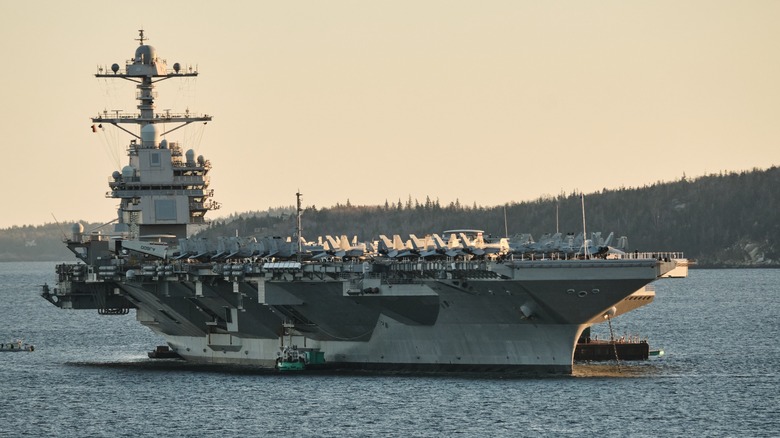
Wandering views/Shutterstock
The United States Navy has christened nine ships with the name Enterprise since 1775. When the last vessel to bear the name, the nuclear USS Enterprise (CVN-65), was decommissioned in December 2012, then-Secretary of the Navy, Ray Mabus, made an announcement: The legacy of «Big-E» wouldn’t actually end with that ship. Instead, the next Gerald R. Ford-class aircraft carrier, CVN-80, would also be named the USS Enterprise.
The forthcoming Enterprise’s construction began in August 2017, and it was meant to enter service in November 2025. Unfortunately, that date has been pushed back due to a rather mundane reason: supply chain issues. According to a statement issued by Huntington Ingalls Industries’ (HII) Newport News Shipbuilding shipyards, where the ship is being built, the problem specifically can be tied back to «delays in material availability and industry/supply chain performance.»
It now looks like the USS Enterprise won’t set sail until September 2029. The Enterprise is the third of 10 planned carriers in the Ford-class, following its predecessors, the USS Gerald R. Ford (CVN-78) and USS John F. Kennedy (CVN-79). The Kennedy has plans to enter service in 2025, while the Ford set sail in 2017. The building of a Ford-class carrier is no easy task, as the ships are the largest and most advanced aircraft carriers the U.S. Navy has. Each vessel brings advanced technologies that make them incredibly complex and challenging to build.
How does the delayed USS Enterprise sail date impact the Navy?
Because of the production delays, the Navy also opted to hold off on purchasing the CVN-82 until 2030. Delaying the acquisition of the Enterprise means the Navy must make changes to planned personnel moves and aircraft allocation.
First of all, should the U.S. enter a conflict at sea, the Navy would have one less aircraft carrier to use in its defense. The delay could impact local jobs and the Virginia shipbuilding industry as well. Todd Corillo, a spokesperson for HII, said in a statement, «Any deviation that lengthens intervals between platforms compared to previously approved shipbuilding plans and forecasts is concerning because of the potential disruption to our supplier base, which continues its recovery amid significant levels of demand for its materials and products.»
Despite the delays and changes in procurement strategy, the Navy hasn’t canceled any of the planned Ford-class carriers. Instead, it will likely adapt its strategy to compensate for this and any future delays.